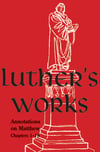Telling nice people things they don’t want to hear is an unavoidable part of being a faithful pastor. On one occasion, a pleasant couple from the neighborhood came to my office. The husband and wife wanted to know my opinion of ghosts and spirits.
The reason, I came to discover, is that the wife believed she had seen the ghost of her deceased mother passing through the rooms and halls of their house. I shared with the couple that upon death, humans pass immediately in spirit either to heaven or to hell, while their physical body remains on earth. For this reason, whatever the woman saw was not the ghost of her beloved mother. It was instead likely an optical illusion or shadow. Had she seen a spirit, it was certainly not her mother’s. She wasn’t satisfied with my answer.
Jesus Walks on Water (Matthew 14:22–27)
The disciples who were gathered in the boat see Jesus walking on the water and believe that they are seeing a ghost. The sight grips them with fear. There comes a fierce storm with what they believe to be a ghost. High winds blow water into the boat. Waves buffet the boat erratically back and forth. There was much to inspire fear. Yet they had nothing to fear.
But the boat by this time was a long way from the land, beaten by the waves, for the wind was against them. (v. 24)
Jesus had directed the disciples to take a boat out onto the sea while He dismissed the crowds. Our Lord wanted to take time to commune with His Father in prayer. Storms were common on the Sea of Galilee. Warm air from the Mediterranean Sea moved east, passing over the mountains and mixing with the cool air. This created storms in the atmosphere over the Sea of Galilee and the surrounding area.
The disciples have been out on the water for some time before Jesus comes walking. Matthew notes that it was the fourth watch of the night. This is 3:00 to 6:00 a.m. The disciples are likely tired, hungry, wet, and frightened. Amid the wind, waves, darkness, and chaos, the disciples believe they have seen a ghost.
But immediately Jesus spoke to them, saying, “Take heart; it is I. Do not be afraid.” (v. 27)
Give Your Fears to the Lord
With these words, the disciples have no excuse. Our Lord identifies Himself. It is not a ghost but Jesus walking on the water. Jesus has given the disciples plenty of reason to trust. Just before this event, our Lord took five loaves and two fish and fed more than five thousand people.
Presently, He demonstrates His mastery over the wind and the waves. It is important that we take this one step further. Jesus does not merely have mastery over the wind and the waves but also over all creation. It is His. He made it. It is only by Jesus’ allowance that the storm came at all.
Essentially, the disciples gave into the fear of nature. They attributed more power to the wind and waves than the One who created them, Jesus. How often do we do the same? Perhaps it is not the wind and waves that we fear but illness, the opinions of others, financial breakdown, relationship failure, and job loss. The list goes on.
There is nothing wrong with a degree of healthy concern, but to fear is to—like the disciples—attribute more power to the things of the world than to the One who made them. Finally, this is a form of worship. We worship what we believe can give us what we have decided we need.
Jesus comes with soothing words. “Take heart; it is I. Do not be afraid.” The message is clear. There is no reason to fear, because Jesus is here. Peter gets this, at least at first. He trusts in Jesus. So he comes out onto the water, at the Lord’s bidding. Initially finding success, Peter loses heart, fearing the coming waves. Like us, and the disciples corporately, Peter placed more faith in the wind that was coming than in the Lord who stood immediately before him.
Jesus Is Always Near (Matthew 14:32–33)
And when they got into the boat, the wind ceased. And those in the boat worshiped Him, saying, “Truly You are the Son of God.” (vv. 32–33)
Notice how things transpire. The winds cease as Jesus steps into the boat. The presence of Jesus brings peace. With Jesus, there is safety. Indeed, the boat became a sacred space and, as we learn in verse 33, a place for worship. Of course, Jesus is present everywhere. Yet, Jesus has chosen a space where the disciples would receive Him. Does this sound familiar?
As Lutherans, we have spaces where we worship that we consider sacred. They are sacred because Jesus is present there. As Jesus made the boat a place to encounter Him in safety, God’s children receive Jesus safely in the sanctuary. As Christ was present in the boat bodily, He is present with us in the Sacrament of Holy Communion. It is also in worship that we hear Jesus’ soothing message of forgiveness, which bids our fears to cease like the wind and the waves.
There is no fear with Jesus, not only because He is the Creator—and therefore creation’s master—but also because Jesus has put to rest what we ought to fear the most: sin, death, and the power of the devil. Through faith, we stand safely in the Lord’s presence. By being present with us in Word and Sacrament, Jesus will sustain us until He takes us to the ultimate sacred space.
 Keep exploring Matthew in Luther’s Works, Annotations on Matthew: Chapters 1–18.
Keep exploring Matthew in Luther’s Works, Annotations on Matthew: Chapters 1–18.
























